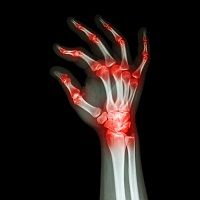Article
Rheumatoid Arthritis Linked to Cardiovascular Events
Author(s):
Rheumatic conditions may have an increased association with adverse cardiovascular events, according to research published in the Annals of Rheumatic Diseases.

Rheumatoid arthritis patients may be at an elevated risk for cardiovascular disease, according to a study published in the Annals of Rheumatic Diseases.
Researchers from the Perelman School of Medicine at the University of Pennsylvania in Philadelphia observed patients with psoriatic arthritis (PsA), rheumatoid arthritis (RA) and psoriasis without known PsA between 1994 and 2010 from The Health Improvement Network in the United Kingdom. Patients aged 18-89 years were included in the study, and included 8,706 PsA patients, 41,752 RA patients, and 138,424 psoriasis patients, as well as 81,573 unexposed control patients. The researchers aimed to determine links to cardiovascular death, myocardial infarction, cerebrovascular accidents, and the composite outcome (MACE).
The researchers found the risk of MACE was higher in patients with PsA not prescribed a disease-modifying antirheumatic drug (DMARD), patients with no RA, patients with psoriasis not prescribed a DMARD, and patients with severe psoriasis. DMARDs were prescribed to more than half of patients with RA and PsA, and included methotrexate, sulfasalazine, or azathioprine, or a biologic DMARD such as adalimumab.
“It’s not terribly surprising that there is an increased risk of heart disease because of the similar levels of systemic inflammation,” the study’s co-lead author Alexis Ogdie, MD, MSCE, told Reuters Health. She continued by saying whole-body inflammation has also been linked to plaque buildup in the arteries.
During the study period, patients with PsA, RA, or psoriasis were more likely to have a heart attack, cardiac arrest, or stroke, or to die from one of those cardiac events. Patients with PsA were 36 percent more likely than the control group to suffer a heart attack, whether or not they had been on a DMARD regimen. Most notably, RA patients on a DMARD regimen were the most likely to suffer a heart attack, which was more than twice the control group. The researchers highlighted a significant association between adverse cardiovascular events and severe psoriasis patients who were prescribed a DMARD, and RA patients who were not.
There was an increase for adverse cardiovascular events across the board during the study period, Ogdie noted.
“Theoretically, treatment of the systemic inflammation and improvement of disease activity through the use of immunosuppressive medications should then decrease the development of atherosclerosis and the risk of heart disease,” she continued. However, she noted using retrospective analysis to conclude this is very difficult.





